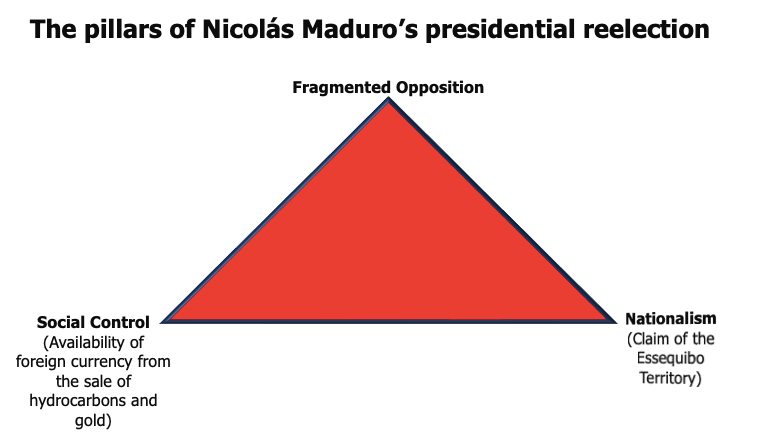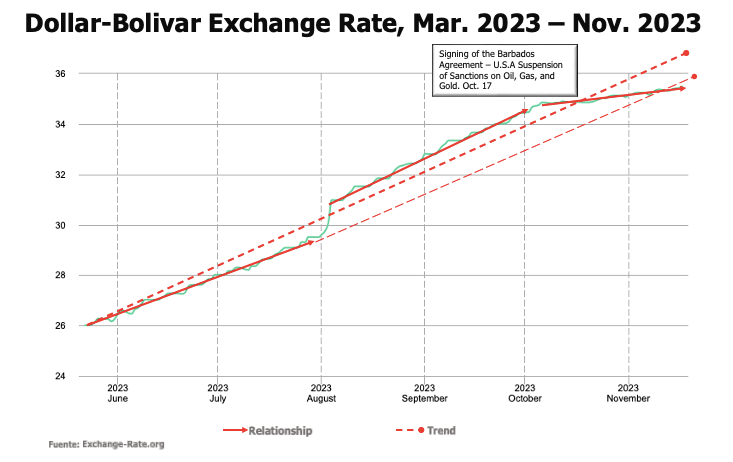





|
Tweet
|
|
|
“Nationalism often plays with the idea of superiority and a unique destiny, leading to exclusion and conflict. It’s a dangerous strategy that can unleash uncontrollable forces”. - Hannah Arendt
The fundamental pillars of Jorge Rodríguez’s strategy for Nicolás Maduro’s presidential reelection are social control, fragmentation of the opposition, and nationalism. Social Control To reconnect with the working classes, Maduro needs foreign currency for importing and distributing food in CLAP bags, paying various bonuses, and increasing the minimum wage, among other measures. High inflation and low wages for public workers and pensioners have played a significant role in growing discontent and disapproval of Maduro’s administration. Eight out of ten Venezuelans desire political change, according to recent opinion polls. The mechanism to obtain legitimate dollar income is exporting oil and refined products to Europe and the U.S. market. For this, lifting U.S. economic sanctions on the state-owned oil company Pdvsa is necessary. The Barbados Agreement is crucial for injecting funds into the state’s coffers. Despite the OFAC’s stance that the reintegration of oil companies into Venezuela’s market does not directly bring foreign currency to Maduro’s regime, this is not entirely accurate. Joint ventures contribute taxes, royalties, and dividends to the state and Pdvsa. Last month alone, these companies generated an estimated $619 million, according to Inter-American Trends. An indicator of increased foreign exchange in the Venezuelan market is the relationship between the U.S. dollar and the Bolívar. Following the agreement’s signing, the devaluation of the national currency has shown a slowing trend, as per data from the Central Bank of Venezuela. Therefore, the strategy to increase the regime’s coffers to make Maduro a competitive candidate in the next presidential election depends on whether the dictatorship betrays or adheres to the Barbados Agreement. Incidentally, it has until next week to demonstrate its commitment to the pact. Nationalism Rodríguez’s other strategy is nationalism, based on stirring a shared national identity feeling, focusing on the Esequibo claim area, threatened by the Guyanese government and Exxon. The strategy involves a consultative referendum aimed at unifying the country around Maduro, given his significant decline in popularity and María Corina Machado’s rise as the democratic forces’ leader after the primary. However, the Caribbean Community (Caricom) firmly supports Guyana, emphasizing inviolable borders and resolving disputes through the International Court of Justice. Moreover, actions by countries like China and Brazil in the Esequibo territory continue, directly impacting Venezuela’s relations with these powers. Key infrastructure projects like the highway linking Manaus with Georgetown indicate how regional geopolitics evolves independently of Venezuela’s actions. International actors like Caricom and the stances of China and Brazil suggest that the Esequibo debate and Maduro’s regime policies could affect its position and perception internationally. Therefore, the nationalism strategy seeks a pretext for transitioning from authoritarianism to a state of national and external shock. Under the guise of protecting the “higher interest of the nation”, individual freedoms could be further restricted, and the 2024 presidential elections could be postponed to 2025 if Maduro’s popularity does not guarantee electoral victory. A military incursion into the Esequibo by the National Bolivarian Armed Forces should be considered carefully. Consequently, with the December 3 consultative referendum, Madurism faces a situation with no clear outcomes. By presenting popular participation as a triumph and validating its five questions, the regime seeks political justification to postpone the presidential election until the first half of 2025, turning it into a mega-election including governorships, mayoralties, and parliamentary seats. This nationalism faces a false sense of patriotism that could lead to disaster. Argentina’s history with the Falkland Islands offers a clear lesson: underestimating international response and clinging to extreme nationalism resulted in both military and political failure. Fragmented Opposition After the primary did not yield the expected result, the strategy to fragment the opposition shifted to 2024. The regime seeks to weaken María Corina Machado’s leadership with the other two mentioned strategies: social control and nationalism. Conclusion Maduro faces over 80% widespread rejection, and international pressure is mounting for free and verifiable elections in 2024. Caricom’s potentially hostile stance towards Venezuela, the reversal of essential licenses by the Biden administration, and the demoralization of the Armed Forces further complicate the country’s political landscape. In addition to political and military challenges, Maduro’s regime faces a complex economic and geopolitical situation. The dependency on revenues from oil and refined product exports, fluctuations in international markets, and regional and global tensions directly influence the regime’s stability. Foreign actors’ involvement in the Esequibo, especially regarding natural resource exploration, is a factor that must be considered. Madurism finds itself at a complex crossroads in its attempt to strengthen its position through a referendum on the Esequibo. The regime’s decisions and actions will determine the course of domestic politics and influence its position on the international stage. In this context, Jorge Rodríguez must reconsider his strategy and seek solutions that promote a democratic exit from the crisis and respect for international law, avoiding the pitfalls of betraying the Barbados Agreement, excessive nationalism, and hasty actions that could have disastrous consequences for both the country and the region. Remember that famous anonymous quote: “The collective strength of a people is like a river in flood; once it rises, it flows with a power that nothing can contain”. Argentina has just demonstrated this. The crude fear campaign against Milei could not overcome the majority’s aspirations. The same could happen in Venezuela. A simple truth lies in the people’s hearts: they are united in their desire for change. Thus, no nationalism, social control, or fragmentation of democratic forces can withstand their will. |


